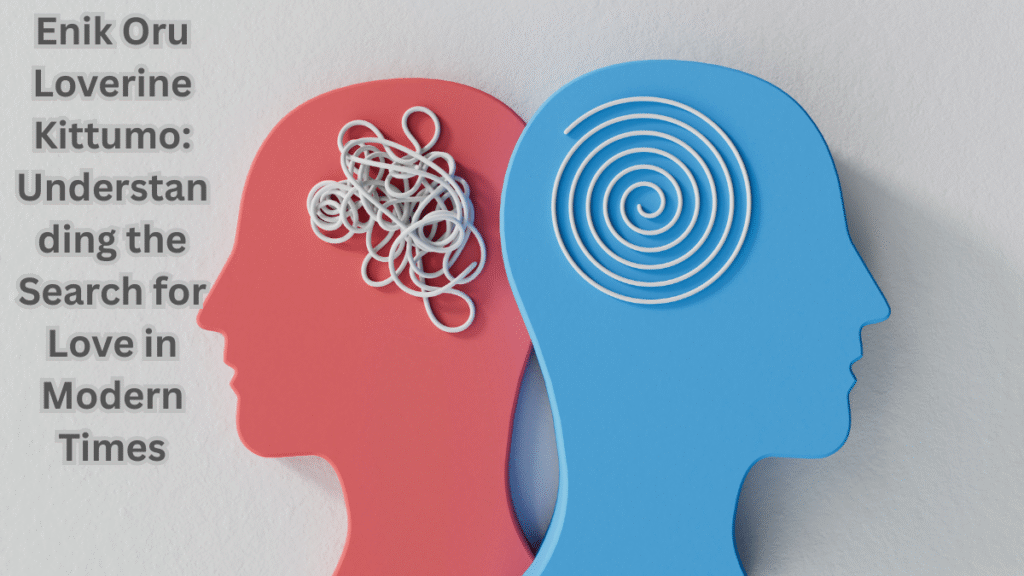The question “Enik oru loverine kittumo?”—translated from Malayalam as “Will I ever find a lover?”—captures a universal human longing. In just five words, it expresses hope, anxiety, curiosity, and vulnerability. Whether whispered in solitude, typed into a search bar, or asked playfully among friends, the phrase reflects one of the oldest quests in human life: the search for meaningful companionship. This article unpacks that question not only linguistically but also socially, psychologically, and culturally, offering readers insights into why we seek love, what it means in different contexts, and how our era of technology, globalization, and shifting values is reshaping the way people find lovers today.
The Meaning Behind the Question
When someone asks “Enik oru loverine kittumo?” they are not merely asking about the likelihood of entering a romantic relationship. The query reflects deeper concerns:
- Personal worth: Am I lovable?
- Timing: Will it happen soon, or am I too late?
- Societal pressure: Why does everyone else seem to find love before me?
- Fate vs. choice: Is love destined, or is it something we actively create?
This makes the phrase simultaneously intimate and collective. The words carry echoes of cultural traditions, personal insecurities, and the timeless mystery of attraction.
Why Humans Ask This Question
1. The Psychological Lens
Humans are wired for connection. Research in psychology shows that belonging is a core need, as essential as food and shelter. The absence of intimate companionship often triggers loneliness, which can manifest in stress, anxiety, and even physical illness. Asking “Will I get a lover?” is a way of voicing this deep biological and emotional need.
2. The Cultural Lens
In Indian and specifically Malayalam-speaking communities, the concept of finding a “lover” has historically been complicated by arranged marriage traditions, family expectations, and cultural modesty. Yet, younger generations are redefining the idea, balancing personal choice with tradition. The question is thus not only personal but also cultural: how does one carve out space for individual love stories in a society that often emphasizes collective values?
3. The Technological Lens
Today, with dating apps, social media, and digital communication, the pathways to finding a lover are expanding rapidly. But paradoxically, the abundance of choice can create confusion and doubt. Asking “Enik oru loverine kittumo?” in 2025 may stem from the overwhelming uncertainty created by too many options, too much comparison, and too much visibility.
Historical Shifts in the Search for Love
Love has not always been a matter of personal pursuit. Historically, unions were arranged for survival, economics, or family lineage. Romantic love as we know it is relatively modern.
- Pre-modern era: Marriage as an arrangement, with “love” growing after commitment.
- Colonial and early modern India: Exposure to literature, cinema, and global narratives introduced romantic ideals.
- Late 20th century: Young people began negotiating between tradition and personal desires, often discreetly.
- 21st century: The idea of finding a lover before marriage gained wide social acceptance, though still uneven across regions.
The question “Will I get a lover?” is thus historically significant—it would not have been asked openly a century ago. Today, it reflects both social change and personal empowerment.
A Table of Perspectives on Love
| Perspective | Key Belief | How It Shapes the Question |
|---|---|---|
| Psychological | Love is a core human need. | The question signals desire for belonging. |
| Cultural | Family and society influence choices. | Anxiety arises when norms restrict freedom. |
| Technological | Apps create opportunities and overload. | People wonder if real love exists in virtual spaces. |
| Philosophical | Love is destiny or choice. | The query blends fate with agency. |
| Economic | Stability often tied to relationships. | Financial independence changes expectations of love. |
The Modern Context of Love in Kerala and Beyond
In Kerala, where Malayalam is spoken, expressions of love are now more visible than before. Young people openly discuss relationships on social media, write love poems, and post photographs with partners. Yet challenges remain:
- Family approval: Parental influence still holds weight.
- Gender expectations: Women may face stricter scrutiny compared to men.
- Urban vs. rural divide: City life offers more anonymity and freedom, while small towns carry tighter social surveillance.
- Generational gap: Parents may not fully understand the younger generation’s priorities in love.
Globally, the same tensions exist in different forms—between tradition and modernity, individuality and community, privacy and visibility.
Why Some Feel They Won’t Find a Lover
Despite opportunities, many still feel excluded from love. Common reasons include:
- Low self-esteem: Believing oneself unworthy of affection.
- Fear of rejection: Avoiding risk leads to loneliness.
- Comparisons on social media: Others’ curated love stories intensify insecurity.
- Unrealistic expectations: Seeking perfection instead of real compatibility.
- Timing and circumstances: Sometimes, external factors like career or family delay relationships.
Understanding these reasons can transform despair into self-compassion. The question becomes less about fate and more about readiness.
The Role of Technology
Dating apps like Tinder, Bumble, and Indian-origin platforms have made “finding a lover” both simpler and more complex. Simpler because they increase access, complex because:
- Users experience choice overload.
- Superficial judgments (based on photos) dominate.
- Ghosting and rejection can damage self-confidence.
- Long-distance online connections challenge trust.
For those asking “Enik oru loverine kittumo?” in 2025, the digital landscape is both opportunity and obstacle.
Love and Mental Health
The question of finding a lover cannot be separated from mental well-being. People often tie their sense of identity to romantic status. But experts caution against making love the sole measure of happiness. Learning self-love, nurturing friendships, and finding purpose beyond romance provide resilience while waiting for—or even without—romantic companionship.
Love Across Different Life Stages
- Teenagers: Curiosity, exploration, and sometimes peer pressure.
- Young adults: Balancing career goals with desire for connection.
- Middle-aged individuals: Rediscovering love after divorce or long solitude.
- Elderly: Companionship and emotional intimacy rather than societal approval.
Asking “Will I get a lover?” takes on new shades of meaning at each stage.
Love in Popular Culture
Malayalam films and literature have played a profound role in shaping how people think about lovers. From classic romantic tragedies to modern urban stories, art has both mirrored and molded real experiences. Similarly, global cinema, music, and novels create a shared language of love that transcends boundaries.
The Future of Love
Looking ahead, the question “Enik oru loverine kittumo?” may evolve with societal changes:
- AI companionship: Virtual partners may blur the definition of a “lover.”
- Global mobility: Cross-cultural relationships will rise.
- Changing norms: Same-sex and non-traditional relationships will gain broader acceptance.
- Longevity: People will search for multiple lovers at different life phases.
The search for love will never disappear, but the answers will look different in the decades ahead.
How to Approach the Question with Hope
- Self-reflection: Understand personal needs and values.
- Openness: Be willing to meet people outside expected circles.
- Patience: Love rarely follows timelines.
- Courage: Vulnerability is the price of intimacy.
- Balance: Cultivate friendships, hobbies, and self-respect alongside romantic hopes.
Asking “Enik oru loverine kittumo?” is less about predicting the future and more about preparing oneself to welcome love when it appears.
FAQs
1. What does “Enik oru loverine kittumo?” mean exactly?
It is a Malayalam phrase that translates to “Will I ever find a lover?” expressing longing for romantic companionship.
2. Is it normal to wonder if I’ll ever find a lover?
Yes. It’s a universal question tied to human needs for intimacy, belonging, and connection across cultures and ages.
3. Does technology make finding a lover easier?
Yes and no. Apps expand opportunities but also create challenges like choice overload and superficial judgments.
4. Can someone live happily without a lover?
Yes. While love enriches life, happiness can also be built through friendships, passions, and self-acceptance.
5. What should I do if I keep asking this question?
Reflect on personal values, nurture self-confidence, and engage in communities—online or offline—that align with your interests. Love often follows naturally when one is engaged fully in life.
Final Reflection
The question “Enik oru loverine kittumo?” is at once deeply personal and profoundly universal. It is the cry of the lonely, the curiosity of the young, the hesitation of the cautious, and the hope of the romantic. It embodies the tension between fate and freedom, tradition and change, solitude and connection. In answering it, we realize that love is not merely about destiny but also about openness, resilience, and the courage to connect. Whether through digital apps, serendipitous meetings, or slow companionships that grow into love, the human journey remains the same: to seek, to wonder, and to hope.







